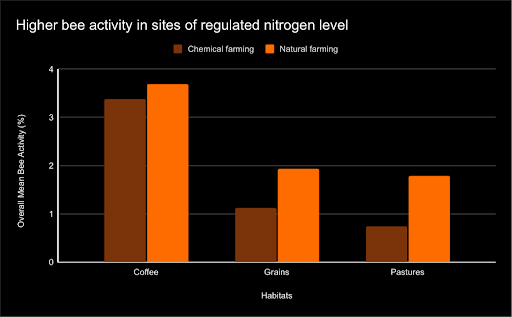Nitrogen and Pollinators – Fertiliser Affecting Pollinators Directly and Indirectly
A groundbreaking study from the University of Sussex and Rothamsted Research has revealed that excessive nitrogen fertiliser use significantly reduces pollinator populations and flower diversity. Conducted at the world’s longest-running ecological experiment site, the research found that even moderate fertiliser application reduces flower numbers fivefold and halves the number of pollinators, with bees being the most affected species.
The Impact of Nitrogen on Pollinators
This study establishes a direct correlation between fertiliser use and pollinator decline. When nitrogen is introduced in excess, fast-growing grasses thrive, producing more leaves but fewer flowers. This aggressive vegetative growth outcompetes other plant species, reducing the diversity of flowering plants essential for pollinators. With 97% of wildflower meadows lost since the 1930s, these findings highlight a critical trade-off for farmers between maximising crop yield and preserving biodiversity.
A Choice Between Short-Term Yield and Long-Term Resilience
Sustaining farms for the future requires making informed choices. Farmers must decide between short-term yield boosts from chemical inputs or investing in long-term benefits by maintaining a resilient pollinator population. By integrating sustainable agricultural practices, farmers can ensure both productivity and biodiversity preservation.
Polly™: A Data-Driven Solution for Sustainable Farming
If you’re looking to reverse the negative impact of excessive fertiliser use, AgriSound offers a solution. Our biodiversity project in El Salvador monitors pollinators across coffee, grain, and pasture habitats, comparing natural farming methods with conventional chemical-intensive practices. Satellite data revealed that farms using chemical inputs had an average nitrogen increase of 27%, leading to a 40% reduction in pollinator activity. This aligns with findings that excessive fertiliser disrupts soil composition, reducing pollen sources for bees.
To build a healthy, eco-friendly farm ecosystem, fostering a resilient pollinator population is essential. Polly™ provides real-time data to help farmers monitor the impact of their conservation and farming practices, ensuring data-backed decisions that benefit both the environment and stakeholders.
Embrace a Healthy Farm Ecosystem
To have a healthy farm ecosystem that is eco-friendly, supports biodiversity, and increases productivity, a resilient pollinator population needs to be established. To see if your farming and conservation practices have any effect on pollinators, Polly™ is the right tool. We can provide real-time data to transform your farming practices to become more resilient and also show proof to stakeholders to get value from the data at every level.
By making informed choices and utilising tools like Polly™, we can work together to create a sustainable and vibrant agricultural environment that benefits both crops and pollinators. Let’s safeguard the future of our farms and the essential pollinators that support them.

